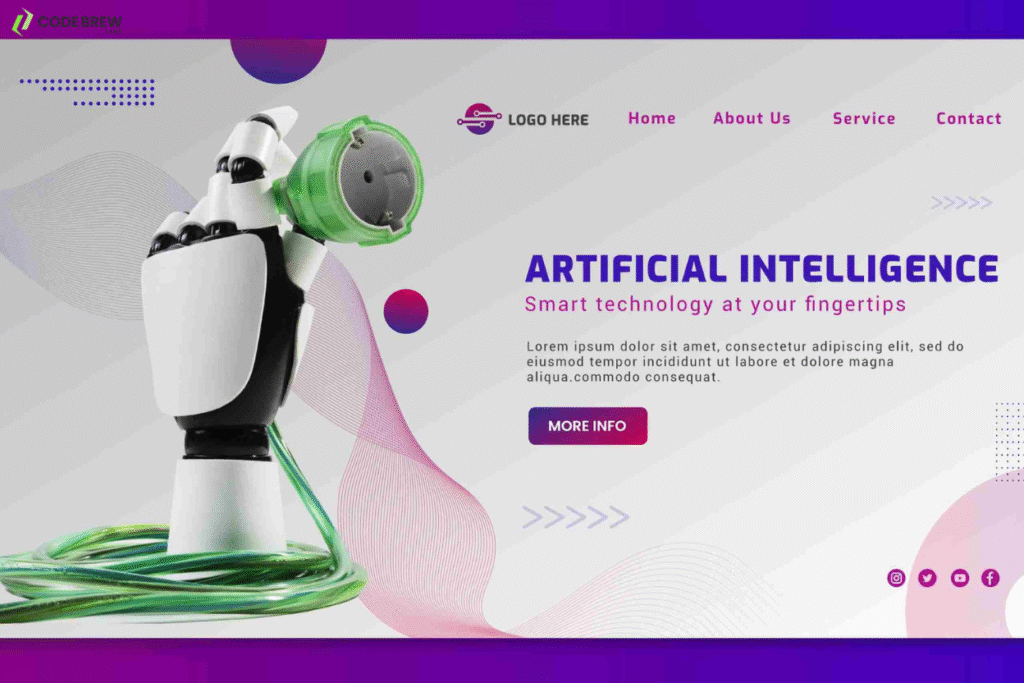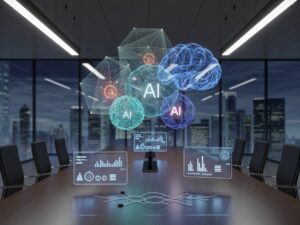
Introduction
The Rise of AI in Mobile and Enterprise Applications
Artificial intelligence has emerged as the decade’s defining technology. Personalized shopping, medical diagnoses, and self-driving cars are just a few examples of how artificial intelligence has become integral to our daily lives. Businesses worldwide are rushing to incorporate intelligent, automated solutions into their applications and systems as the global AI industry soars above $300 billion in 2025.
This explosive growth has led to one inevitable challenge: Who should you hire to bring your AI idea to life? Should you partner with a solo AI app developer or a traditional AI development company? While both can technically get the job done, the experience, outcome, and costs can differ dramatically.
This guide will help you understand the core differences between these two options so you can make a smart, informed decision based on your goals, budget, and project scale.
Who Are AI App Developers?
AI app developers are usually individual experts or freelancers who specialize in incorporating AI features into applications. They might be machine learning engineers, data scientists, or software developers with advanced AI understanding. Some work full-time for businesses and freelance on the side; others are completely self-sufficient, providing project-based or hourly services.
These developers are usually well-versed in:
- Machine Learning (ML) frameworks like TensorFlow, PyTorch, and Scikit-learn
- Programming languages such as Python, R, and Java
- Data processing tools like Pandas, NumPy, and Apache Spark
- Cloud AI services like AWS SageMaker, Google Vertex AI, and Azure ML
They often work on smaller, more focused projects such as building AI chatbots, recommendation engines, or predictive analytics dashboards. Since they work alone or in small teams, they typically move fast, iterate quickly, and can be a great fit for startups or MVPs.
What sets AI app developers apart is their hands-on coding expertise and their ability to dive into specific problems without the overhead of a large organization. If you need something built efficiently and on a tight budget, these developers can be a lifesaver.
What Is a Traditional AI Development Company?
Traditional AI development companies are full-fledged agencies that provide end-to-end AI solutions. These firms employ multidisciplinary teams including data scientists, software engineers, AI researchers, project managers, UI/UX designers, and QA testers. They offer comprehensive services ranging from initial consulting and data modeling to deployment and long-term support.
Here’s what they typically provide:
- AI strategy and consulting
- Custom AI model development
- Mobile and web app integration
- Data warehousing and preprocessing
- Ongoing maintenance and optimization
- Compliance, security, and documentation
These companies often follow a structured, phased development cycle planning, prototyping, development, testing, deployment, and maintenance. They also use standardized project management tools like Jira, Asana, and Monday.com to keep communication organized and transparent.
Traditional AI agencies are ideal for larger, more complex projects that require scalability, security, and professional support. Think enterprise-level AI solutions, integrations with existing systems, or regulated industries like healthcare and finance.
Key Differences Between AI App Developers and AI Companies
The differences between an AI app developer and a traditional AI development company can be boiled down into a few key areas:
Project Scope and Complexity
AI App Developers: Focused and Nimble
Individual AI app developers are best suited for targeted tasks or single-purpose AI functions. If you’re building an MVP, a chatbot, or a specific machine learning model, an experienced AI freelancer can deliver excellent results quickly and cost-effectively.
- Ideal for short-term projects, rapid prototyping, or one-off features.
- Limited in handling cross-functional requirements like data engineering, DevOps, or compliance.
- May rely on open-source tools and pre-trained models due to bandwidth and budget constraints.
AI Companies: Full-Cycle, Enterprise-Ready
AI development companies are geared toward end-to-end AI solutions. From strategy and design to development and deployment, they bring structured workflows and a multi-disciplinary team approach.
- Suitable for large-scale or enterprise projects requiring cross-functional collaboration.
- Capable of integrating AI into broader ecosystems like CRMs, ERPs, IoT devices, or custom web platforms.
- Often develop proprietary algorithms, custom data models, and secure infrastructure tailored to industry-specific needs.
2. Team Structure and Expertise
AI App Developers: Specialist Individuals
Hiring an AI app developer usually means working with a single developer or a small team. Typically, they specialize in particular areas of artificial intelligence, including natural language processing (NLP).
- Natural Language Processing (NLP)
- Computer Vision
- Predictive Analytics
- Deep Learning
Although they may possess exceptional proficiency in TensorFlow, PyTorch, Keras, Scikit-learn, and Python, they can lack the assistance of a designer, QA engineer, or DevOps specialist.
AI Companies: Cross-Functional Teams
AI companies operate with dedicated teams that often include:
- AI/ML engineers
- Data scientists
- Project managers
- UX/UI designers
- QA testers
- DevOps specialists
This team-based model ensures that each component of the AI solution is handled by a domain expert, resulting in higher quality, faster delivery, and better scalability.
3. Communication and Workflow
AI App Developers: Direct and Informal
Communication with individual developers is usually direct and hands-on. You speak with the person writing the code, making it easier to align quickly on changes or feedback.
- Flexible tools: Email, Slack, Zoom
- Agile response times and decision-making
- You manage timelines and quality assurance
However, this can be a double-edged sword. If the developer is unorganized or overbooked, communication might suffer.
AI Companies: Managed and Structured
AI agencies use project managers to mediate between clients and development teams. This creates a buffer that ensures professionalism and consistency but may slow down urgent updates or require formal change requests.
- Managed tools: Jira, Trello, Notion, Basecamp
- Scheduled progress reports and milestone check-ins
- Clear SLAs and escalation paths for support
You get less personal interaction with the developers but more project oversight and process clarity.
4. Speed and Flexibility
AI App Developers: Fast, But Risky
One major advantage of freelancers is their ability to start quickly and pivot fast. They don’t have internal approval chains or bureaucratic delays.
- Fast onboarding
- High agility for changes and iteration
- But also: risk of bottlenecks, scope creep, or burnout
If a project hits unexpected technical challenges, an individual may not have the resources to adapt swiftly.
AI Companies: Slower Start, More Stability
Agencies typically need more time to:
- Define project scopes
- Assemble teams
- Create Gantt charts or sprint cycles
While this structured approach may feel slower initially, it pays off in predictability, delivery, and stability, especially for long-term or critical systems.
5. Post-Launch Support and Maintenance
AI App Developers: Limited or Ad-Hoc
Once the project is delivered, most freelancers move on. While some offer hourly support contracts or maintenance retainers, ongoing support may be inconsistent.
- No guaranteed bug fixes unless under contract
- Dependency on one person for updates or upgrades
- You may need to rehire or onboard someone new later
AI Companies: Dedicated Support Contracts
Agencies typically offer formal maintenance contracts, with guaranteed support, monitoring, bug fixes, and even AI model retraining when needed.
- Structured SLAs (Service Level Agreements)
- Feature roadmap planning
- Updates in sync with OS, API, and compliance changes
This makes them better suited for mission-critical apps or products with evolving needs.
6. Risk Management and Reliability
AI App Developers: Higher Personal Risk
An individual may:
- Overpromise and underdeliver
- Disappear mid-project
- Lack of backup if health or personal issues arise
This isn’t always the case many freelancers are incredibly reliable but the risk is inherently higher due to single-point dependency.
AI Companies: Lower Risk, Shared Responsibility
With agencies:
- Contracts outline scope, timelines, and accountability
- Multiple people can step in if someone is unavailable
- Reputable firms offer references, insurance, and SLAs
The process is less personal but significantly more professional and predictable.
One isn’t inherently better than the other it all depends on what you need. A startup with a $10k budget may find more value in a sharp AI freelancer, while a fintech company launching a new AI-powered platform should probably go with an agency.
Pros and Cons of Hiring Individual AI App Developers
Advantages
- Affordability: One of the biggest advantages is cost. Freelancers don’t have the overhead of office space, HR, or middle management.
- Agility: Decisions are made quickly. You can iterate faster and get feedback in real-time.
- Direct communication: You speak directly with the person doing the work, leading to better clarity and less miscommunication.
- Focused expertise: Many freelance AI app developers specialize deeply in certain niches like NLP, computer vision, or predictive modeling.
Disadvantages
- Limited bandwidth: A solo developer can only do so much. Complex projects can lead to burnout or long delays.
- No formal QA or testing teams: You’ll likely need to hire separate testers or do the testing yourself.
- Risk of unavailability: If the developer falls ill or goes MIA, your project can grind to a halt.
- Limited long-term support: Most freelancers move on after the initial build is done, which can be a problem if you need updates or bug fixes later.
Pros and Cons of Hiring a Traditional AI Development Company
Advantages
Traditional AI development companies offer a level of structure and professionalism that many individual freelancers simply can’t match. Here’s why businesses especially those with complex or high-stakes projects often go this route:
- Full-service teams: Agencies come with complete squads AI engineers, UI/UX designers, QA testers, DevOps specialists, and project managers all ready to work in sync.
- Scalability: Need to add features or expand the project scope mid-way? No problem. Agencies have the resources to scale your project without compromising timelines.
- Project management: These companies typically follow proven methodologies like Agile or Scrum, ensuring timely delivery, risk management, and progress tracking.
- Long-term support: Maintenance contracts, SLA agreements, and dedicated support teams are standard. That means you get consistent updates and bug fixes post-launch.
- Quality assurance and security: Agencies usually have strict QA protocols and follow best practices for cybersecurity, compliance, and ethical AI.
If you’re launching a product that will impact thousands or millions of users, the structure and expertise an agency provides can be a game-changer.
Disadvantages
Of course, hiring a traditional AI agency isn’t all sunshine and roses. There are definite downsides to consider:
- Higher cost: You’re paying for a premium service, and it shows. Agency rates can be 2–3x more than what a freelancer might charge.
- Slower decision-making: With more people involved, decisions often take longer. You might face layers of approvals and process checks.
- Less flexibility: Agencies often operate on strict scopes and contracts. Changing requirements mid-project may incur extra costs or delays.
- Potential communication delays: While you get a project manager as a liaison, it sometimes means indirect communication with the developers themselves.
If budget and agility are top priorities, you may find agencies a bit rigid or slow for your pace.
When to Choose an AI App Developer
Individual AI app developers are ideal in specific situations. Here’s when going solo makes sense:
- Building a prototype or MVP: If you’re in the early stages of developing a proof-of-concept or testing the market, a solo AI developer can get you there quickly and affordably.
- Budget constraints: Startups or small businesses with limited funding often find freelancers more accessible financially.
- Short-term or one-off projects: For tasks like integrating a chatbot, setting up a machine learning model, or analyzing data, hiring an independent expert can be very effective.
- Hands-on involvement: If you want direct collaboration and real-time decision-making, working with one person instead of an agency can make the process more fluid.
Just remember to vet them thoroughly. Look for someone with a proven track record, strong references, and ideally a portfolio of similar AI projects.
When to Choose a Traditional AI Development Company
On the other hand, a traditional AI development company is your go-to for:
- Large-scale enterprise solutions: Projects that involve multiple stakeholders, complex integrations, and long-term goals benefit from the resources of an agency.
- End-to-end product development: From ideation to deployment, agencies provide a structured path, which is great if you’re not technically inclined or don’t want to manage multiple vendors.
- Projects with strict regulatory requirements: Industries like healthcare, finance, and government require compliance with GDPR, HIPAA, ISO, and other standards, areas where agencies usually have experience and infrastructure.
- Ongoing support and evolution: If your product evolves continuously with new features, AI training models, or data updates, an agency ensures consistency and dedicated long-term support.
Agencies shine when there’s a need for stability, structured workflows, and cross-functional collaboration over a long period.
How to Vet AI App Developers
Choosing the right individual developer means knowing how to evaluate them properly. Here’s what to look for:
- Technical skills: Check their experience with key AI tools and frameworks like TensorFlow, PyTorch, Keras, Scikit-learn, and OpenCV.
- Portfolio and case studies: Ask to see specific examples of past projects. Ideally, they should align with your goals.
- Code quality: Request a GitHub link or coding sample to assess structure, documentation, and readability.
- Communication: Great coders aren’t always great communicators, but you need both. Test their responsiveness, clarity, and ability to explain concepts in layman’s terms.
- Reputation: Use platforms like Upwork, Toptal, and Fiverr Pro to read reviews and check ratings.
- Participation in the AI community: Developers active on Kaggle, GitHub, Stack Overflow, or AI forums tend to stay updated with the latest trends and tools.
Also, consider giving them a small paid test task before committing to a full project. It’s a safe way to gauge how they work under pressure and meet deadlines.
How to Vet Traditional AI Companies
When evaluating a development agency, your criteria shift a bit. Here’s how to make sure you’re choosing the right one:
- Portfolio: Review case studies that mirror your industry and project type. Pay attention to outcomes, user impact, and innovation.
- Client testimonials: Speak to past clients, especially those with similar project scopes or industries. Ask about communication, timeliness, and post-launch support.
- Team expertise: Ask who will work on your project, not just who’s listed on the website. Review their CVs, certifications, and technical stack experience.
- Compliance and security: Ensure they follow protocols for data privacy (GDPR, HIPAA) and have secure development practices (e.g., regular audits, code reviews).
- Development methodology: Agile? Scrum? Waterfall? Know what system they follow and whether it matches your preferred work style.
- Support model: What happens after launch? Make sure they offer clear SLAs, bug-fix timelines, and upgrade paths.
Finally, don’t forget to request a proposal or RFP. This will give you a sense of how thorough and professional their planning process is.
Collaboration Models and Communication
Freelancers vs. Structured Project Teams
One of the most significant differences between hiring an individual AI app developer and a traditional AI development company lies in how you collaborate with them.
When working with freelancers, the collaboration tends to be informal and more flexible. You’ll likely:
- Communicate directly via email, Slack, or Zoom
- Set expectations personally
- Handle your own project timelines and task assignments
This can be ideal for fast-paced environments where decisions need to be made quickly. However, it also means you’re responsible for project management, feedback loops, and quality control.
In contrast, traditional AI companies use structured project teams:
- You interact primarily with a project manager or account lead
- Communication is scheduled, consistent, and often documented
- Task assignments, development cycles, and testing follow standardized processes
Agencies typically use tools like Jira, Trello, or Asana for transparency and progress tracking. This level of formality ensures consistency and accountability, especially useful when projects have multiple moving parts or stakeholders.
Remote and Hybrid Working Styles
In 2025, remote work is the norm, whether you’re hiring freelancers or agencies. But how they manage remote work can vary.
Freelancers:
- Work from anywhere, any time
- May have overlapping hours with your team, or may not
- Rely on flexible communication styles
Agencies:
- Often maintain hybrid teams across global time zones
- Use standardized working hours, daily standups, and structured updates
- Provide dedicated communication channels and documentation protocols
The key here is alignment. Ask your developer or agency how they handle:
- Time zone differences
- Response times
- Project updates and milestone reviews
Effective communication is the glue that holds remote AI development together don’t underestimate it.
Quality, Security, and Compliance
Ensuring Data Privacy and AI Ethics
AI applications often deal with sensitive data financial records, personal health information, behavioral analytics so privacy and ethics aren’t just nice-to-haves; they’re non-negotiable.
Freelancers:
- May follow best practices, but there’s no universal standard unless specified
- Require you to set the rules around data encryption, storage, and usage
- Might not include legal compliance or documentation unless requested
Agencies:
- Usually adhere to international compliance frameworks like GDPR, HIPAA, ISO/IEC 27001
- Provide formal security audits and data protection protocols
- Implement AI ethics guidelines (bias mitigation, model transparency, etc.)
When hiring either option, you should ask:
- How is sensitive data handled and stored?
- What encryption methods and security protocols are in place?
- Are AI models explainable and auditable?
- Is the app compliant with industry-specific regulations?
Don’t wait until something goes wrong. Build security and compliance into your project from day one.
Scaling Your AI App or Solution
AI development isn’t just about building version 1.0. If your solution gains traction, you’ll need to scale add features, accommodate more users, handle new data, or deploy across new platforms.
With Freelancers:
- May struggle with larger workloads or scaling infrastructure
- Might not have the breadth of knowledge for cross-functional needs (e.g., DevOps, data engineering)
- Often need to onboard new freelancers for growing demands
With Agencies:
- Can easily scale teams based on your project needs
- Offer long-term partnership models with maintenance and upgrade cycles
- Provide enterprise-grade infrastructure and deployment pipelines
If scaling is part of your roadmap and it should be think long term. It’s easier to scale with a flexible, well-equipped team than cobbling together new freelancers every time your app levels up.
Future Trends: AI App Developers and Agencies in 2025 and Beyond
The landscape of AI development is evolving fast. Here’s what’s coming down the pipeline:
- Low-code and no-code AI: Freelancers may begin integrating tools like Google AutoML, Microsoft Power Platform, and Peltarion to build AI features faster without extensive coding.
- AutoML & AI-as-a-Service (AIaaS): Agencies are leveraging plug-and-play models to speed up development while maintaining enterprise-grade performance.
- Ethical AI frameworks: Both freelancers and agencies are expected to adopt ethical guidelines for building responsible AI applications.
- AI in real-time edge computing: Expect more apps that use on-device AI, reducing latency and enhancing privacy.
- Integrated DevOps & MLOps pipelines: Seamless deployment of AI models using tools like MLflow, Kubeflow, and Seldon is becoming standard.
In short, both AI freelancers and agencies are leveling up. The key is finding someone (or a team) who’s skilled today but prepared for tomorrow.
Conclusion
The final decision between an AI app developer and a conventional AI development business depends on the size, scope, and goals of your project.
If you’re a startup developing your first product, a skilled AI freelancer might be all you need. However, if you’re establishing a powerful AI-powered platform, handling sensitive data, or preparing for tremendous expansion, an agency may be a better investment.
FAQs
1. What’s the main difference between hiring a freelancer and an agency for AI development?
A freelancer offers flexibility and affordability for smaller projects, while an agency provides structured, scalable services with full team support for complex, enterprise-grade solutions.
2. Can AI app developers build complex enterprise-level apps?
Some can, especially experienced senior developers, but large-scale enterprise apps usually require a full team, which agencies are better equipped to provide.
3. How do AI development agencies ensure security and compliance?
They follow strict protocols, conduct security audits, and comply with regulations like GDPR, HIPAA, and ISO standards. Many offer built-in legal and compliance services.
4. Are AI freelancers reliable for long-term projects?
It depends on the individual. Some freelancers are highly dependable, but they may lack the resources or availability to handle long-term scaling and support.
5. What’s the average cost difference between hiring an AI app developer and an agency?
Freelancers typically charge $50–$150/hour, while agencies range from $120–$250/hour, depending on expertise and project scope.


